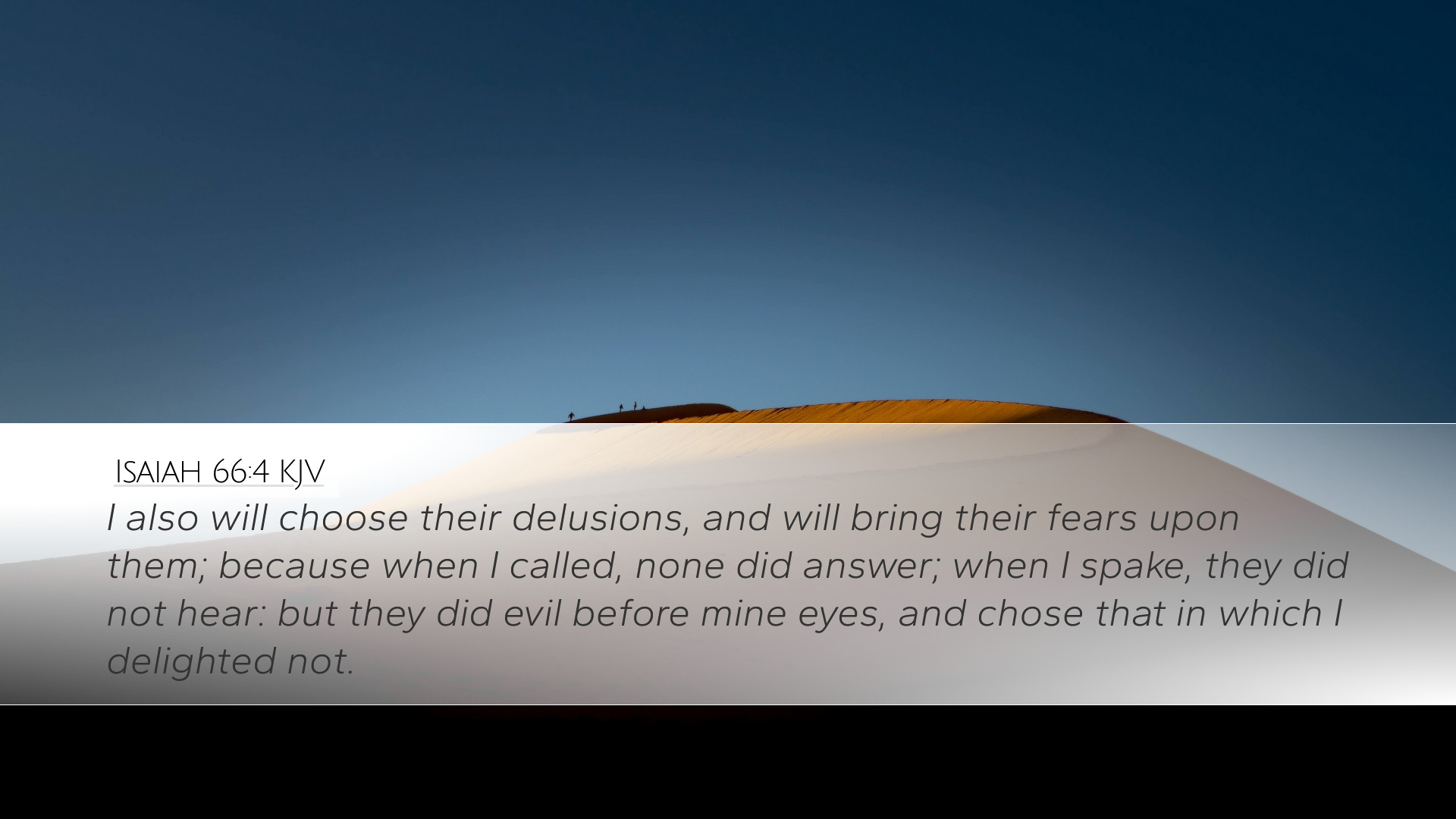Commentary on Isaiah 66:4
Isaiah 66:4 (KJV): "I also will choose their delusions, and will bring their fears upon them; because when I called, none did answer; when I spake, they did not hear: but they did evil before mine eyes, and chose that in which I delighted not."
Contextual Overview
The final chapter of Isaiah deals with the themes of divine judgment and the promise of restoration. Isaiah 66 culminates the prophetic book, highlighting the contrast between the people who genuinely seek God and those who reject Him. This particular verse encapsulates the consequence of a refusal to heed God’s call and the resulting divine response.
Matthew Henry's Commentary
Matthew Henry provides a profound insight into the nature of God's judgment in Isaiah 66:4. He emphasizes that the “delusions” God chooses for the wicked arise not from an arbitrary decision but as a direct consequence of their refusal to respond to His voice. Henry interprets this choice as a manifestation of God's sovereignty in dealing with unrepentant hearts. The passage serves as a warning against spiritual apathy, illustrating that neglecting God leads to spiritual deception.
Henry also reflects on the seriousness of God calling His people to a relationship characterized by obedience. When they refuse to answer His call, they incur the consequences of their choices. This part of the commentary serves as a reminder to leaders and scholars of the importance of responding faithfully to God's guidance.
Albert Barnes' Notes
Albert Barnes approaches this verse through the lens of divine retribution. He notes that God, in essence, allows individuals to experience the “fears” they have cultivated through their disobedience. Barnes expounds on the idea that God indeed extends an invitation to repent; however, when this is spurned repeatedly, He responds by letting people have their own way, resulting in the very fears that they choose to entertain manifesting as reality.
- Key Points from Barnes:
- God's long-suffering and call to repentance are critical themes.
- People's fears reflect their internal state and rejection of God's peace.
- Divine judgment often comes as a result of self-imposed delusions or choices.
His commentary encourages pastors to understand the importance of emphasizing God’s call towards a righteous life, urging congregants not to underestimate God's patience but to recognize the weight of ignoring His voice.
Adam Clarke's Commentary
Adam Clarke adds a rich layer of understanding by focusing on the anguish of the people who reject God. He states that those who do not hear God’s voice when He speaks will be left to their own devices, which is a terrifying prospect. Clarke connects this to the broader theme of God desiring a faithful response from His people, expressing that their choice to do “evil before mine eyes” illustrates a rebellious spirit.
Clarke underscores that the “delusions” chosen by God signify the consequences of sin, both in the earthly and eschatological sense. He reflects on how God can step aside, allowing people to encounter the reality of their choices, which serves as both a punishment and a form of divine justice. His insights provide vital considerations for scholars as they contemplate the nature of divine-humann interaction, particularly regarding obedience and rebellion.
Theological Implications
The verse serves as a springboard for discussions on theodicy and the nature of free will in relation to divine sovereignty. The combined commentaries suggest that God's justice is invariably linked to His mercy; He desires to call His people to a place of repentance. The tension between divine selection and human agency surfaces in this passage, prompting theological reflections on how God interacts with those who have consistently turned away from Him.
- Implications for Theology:
- The nature of God’s judgment as it relates to human choices
- The role of divine sovereignty in human affairs
- The significance of heeding God's call to avoid spiritual downfall
Practical Applications for Life and Ministry
For pastors and students of the Word, Isaiah 66:4 serves as a grave reminder of the dangers of spiritual complacency. The following applications can be drawn from this passage:
- Awakening to God's Voice: Regularly engaging with scripture and prayer should be emphasized in congregations to cultivate sensitivity to God's leading.
- Teaching on Sin and Consequence: Sermons and teachings should illustrate that, while God is loving and merciful, there are severe consequences for choosing to turn away from Him.
- Encouraging Repentance: Ministers should provide avenues for confession and repentance, reminding individuals of the hope found in reversing one's course towards God.
- Community Accountability: Encouraging accountability within the church can help prevent individuals from falling into delusion or a hardened heart.
In conclusion, Isaiah 66:4 serves not only as a stark warning, but also as a call to action, urging believers to maintain a responsive and obedient posture towards God, lest they be ensnared in delusions of their own making.


